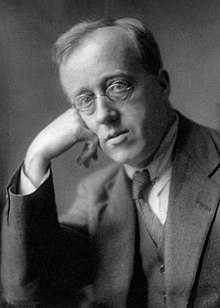Gustav Holst
British composer
Gustavus Theodore von Holst (21 September 1874 – 25 May 1934) was an English composer and music teacher. He is best remembered for his choral music and works for orchestra, of which the most famous is certainly The Planets. He changed his name to Gustav Holst during the First World War because of prevalent anti-German feeling.

| This musician-related article is a stub. You can help out with Wikiquote by expanding it! |
Quotes
edit- Never compose anything unless the not composing of it becomes a positive nuisance to you.
- Cited in Imogen Holst The Music of Gustav Holst (1951) p. 73 as "His favourite piece of advice".
- Always ask for advice but never take it.
- Paul Holmes Holst (1997) p. 106.
- Holst's maxim according to Vaughan Williams.
- If nobody likes your work, you have to go on just for the sake of the work. And you're in no danger of letting the public make you repeat yourself. Every artist ought to pray that he may not be "a success". If he's a failure he stands a good chance of concentrating upon the best work of which he's capable.
- Remark to Clifford Bax, reported in Imogen Holst Gustav Holst: A Biography (1969) p. 81.
- One of the advantages of being over forty is that one begins to learn the difference between knowing and realising.
- Letter to W G Whittaker, 1914, quoted in Paul Holmes Holst p. 62.
- Music, being identical with heaven, isn't a thing of momentary thrills, or even hourly ones. It's a condition of eternity.
- Letter to W G Whittaker, 1914, quoted in Paul Holmes Holst p. 62.
- The enormity of the universe revealed by science cannot readily be grasped by the human brain, but the music of The Planets enables the mind to acquire some comprehension of the vastness of space where rational understanding fails.
- Quoted in Michael Short, Gustav Holst 1874-1934: A Centenary Documentation